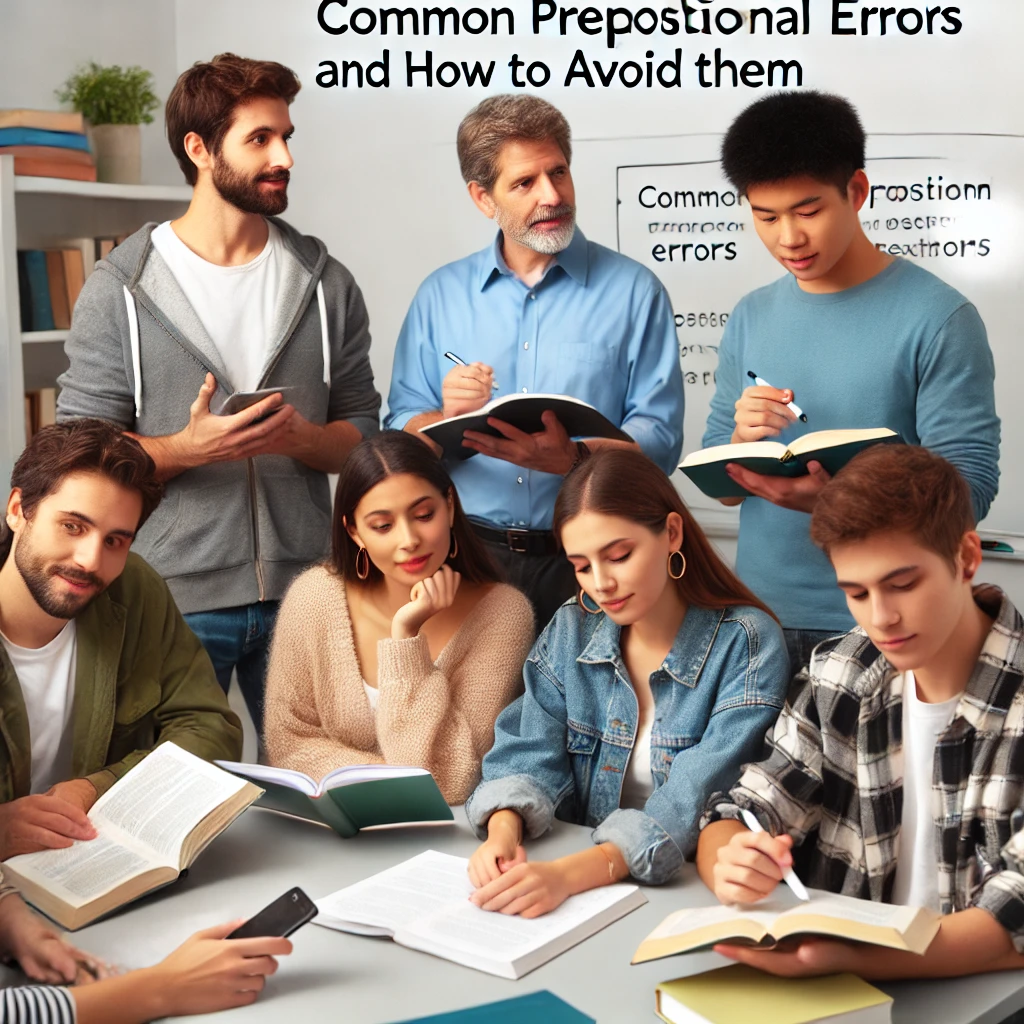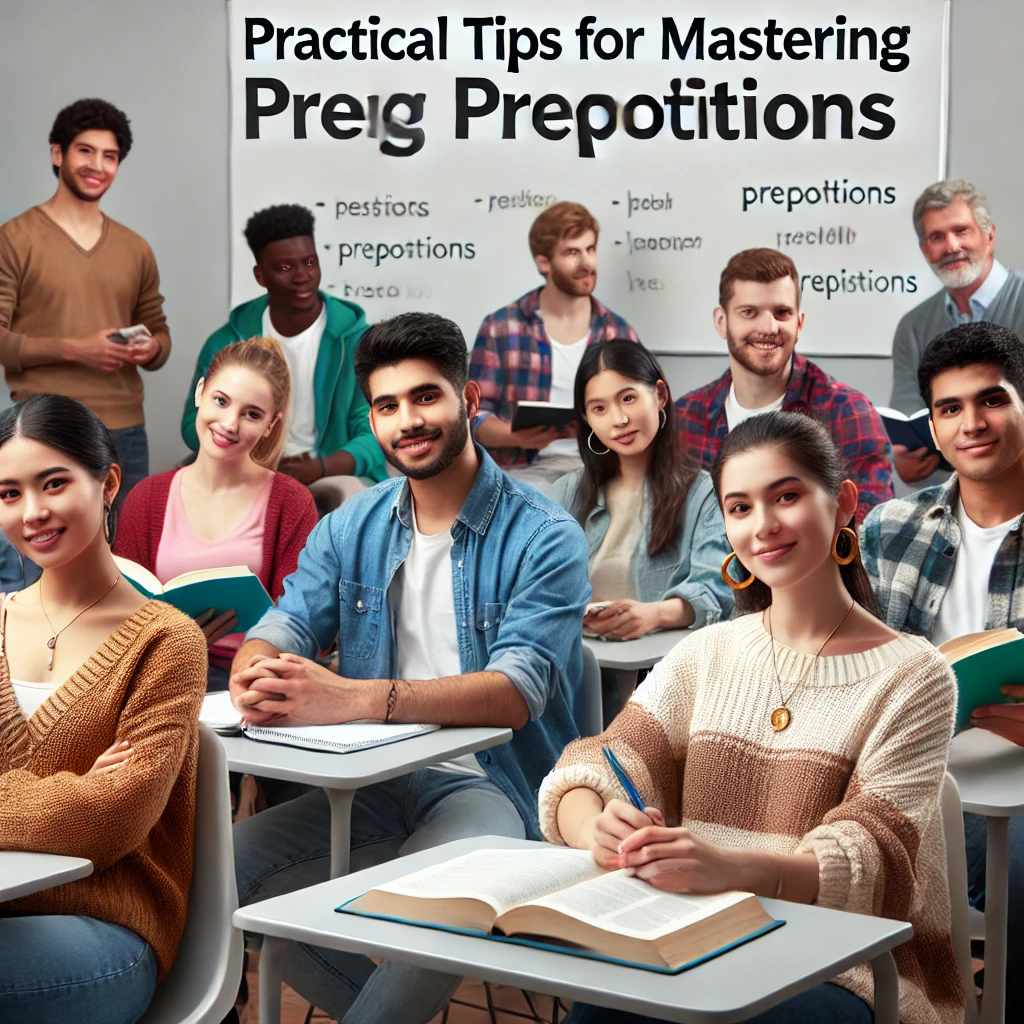Master prepositions with ease! Discover common mistakes English learners make and how to avoid them with practical tips and examples. Perfect for ESL students aiming to improve their grammar skills.
Prepositions are small but mighty words that connect a noun or pronoun to another word in a sentence. They show relationships, like time, place, direction, and more. Understanding them is key to clear communication.

Let’s start with some basics. Prepositions like ‘in’, ‘on’, ‘at’, ‘by’, and ‘for’ might seem simple, but they carry a lot of weight in sentences. They’re the glue that helps stick elements together. Think about how you’d say, ‘I am at the park’ versus ‘I am in the park’ – they paint different pictures, right?
Prepositions fall into a few categories. Time prepositions (like ‘before’, ‘after’, ‘during’) help us know when something happens. Place prepositions (‘under’, ‘over’, ‘between’) tell us where something is. And don’t forget direction prepositions (‘to’, ‘from’, ‘toward’) which point us in the right way. Each type serves its purpose in making sentences whole.
Knowing the role they play in sentence structure is a must. Prepositions usually sit before a noun or pronoun, forming what we call a prepositional phrase. For example, ‘under the bridge’ or ‘before the meeting’. These phrases can act as adjectives or adverbs, giving more info about a verb, noun, or another adjective.
| Common Prepositional Mistake | Why It’s a Mistake | How to Rectify It |
|---|---|---|
| 1. Depend of | “Of” is incorrect; the correct preposition is “on.” | Use “depend on”: I depend on you. |
| 2. Discuss about | “Discuss” already implies “about,” so the preposition is redundant. | Use “discuss”: We discussed the issue. |
| 3. Married with | “With” is incorrect; use “to” when referring to a spouse. | Use “married to”: She is married to John. |
| 4. Arrive to | “To” is incorrect after “arrive”; the correct preposition is “at” or “in,” depending on the location type. | Use “arrive at/in”: We arrived at the hotel. or We arrived in New York. |
| 5. Good in something | “In” is incorrect when talking about skills; use “at.” | Use “good at”: She is good at math. |
| 6. Interested for | “For” is incorrect; “in” should be used with “interested.” | Use “interested in”: I’m interested in learning English. |
| 7. Complain for | “For” is incorrect; “about” should be used to express a complaint. | Use “complain about”: He complained about the noise. |
| 8. Listen music | Missing preposition; “to” is required before “music” or other objects of listening. | Use “listen to”: I like to listen to music. |
| 9. Explain me | Missing preposition; “to” is required when explaining something to someone. | Use “explain to me”: Can you explain this to me? |
| 10. On the weekend | “On” is used in American English, but in British English, “at” is more common. | Use “on the weekend” for American English and “at the weekend” for British English. |
Finally, let’s look at some of the go-to prepositions we see every day. Words like ‘about’, ‘after’, ‘against’, ‘among’, ‘around’ – they’re part of our daily chats and writing. But, misuse them, and you might end up confusing your reader. That’s why it’s key to get the hang of their meanings and proper usage.
Common Prepositional Errors and How to Avoid Them
Prepositions can trip up even the best writers. Some of the most common mistakes involve mixing up ‘in’, ‘on’, and ‘at’. Think about locations: ‘in’ indicates something inside, ‘on’ suggests a surface, and ‘at’ points to a specific place. For example, ‘in the car’, ‘on the roof’, ‘at the movies’.

When it comes to verbs, some need specific prepositions. Take ‘depend’, which often pairs with ‘on’. Saying ‘depend from’ or ‘depend of’ is off. Same with ‘listen to’ instead of ‘listen at’. Verb-preposition combos are like set teams – keep them together right!
Time prepositions are another hot spot for errors. ‘In the morning’, ‘on Monday’, ‘at 5 PM’ – these are standard. So, it’s a mistake to say ‘in Monday’ or ‘on 5 PM’. Getting these wrong can mess up the whole meaning and confuse your message.
Prepositional phrases can also trip folks up. Using ‘of’ when ‘for’ fits, or misplacing ‘between’ with ‘among’. ‘Between’ is for two items (‘between the lines’) and ‘among’ deals with more than two (‘among friends’). Precision matters in keeping sentences clear and correct.
Practical Tips for Mastering Prepositions
Remembering the correct prepositions can feel tricky, but there are some solid techniques to make it easier. One way is to use mnemonic devices. For example, to recall time prepositions, think of ‘IN the morning’, ‘ON Monday’, and ‘AT 5 PM’. A little mental jingle can stick with you.

Examples and practice exercises can be your best friends. Writing sentences with different prepositions, then checking them, helps reinforce correct usage. Practice makes perfect, right? Try this: Write sentences using ‘in’, ‘on’, and ‘at’. Then, check if they fit the rule: Inside for ‘in’, a surface for ‘on’, and specific spots for ‘at’.
Visual aids, like charts and diagrams, are super helpful too. Creating a chart that categorizes common prepositions by type (time, place, direction) gives you a quick reference guide. This way, a glance can remind you which preposition fits your sentence.
Resources for continued learning are essential. Books, online exercises, and apps like Mondly or English Class 101 can offer steady practice. The more you engage with prepositions in context, the better you’ll get at using them naturally. Immersing yourself in reading and writing in English helps, too. Seeing prepositions in action reinforces how they work in real sentences.
Improving Your Writing with Correct Preposition Usage
Correct preposition usage can drastically improve your writing clarity. When your sentences are clear, your ideas come through stronger and easier for your readers to understand.

Common errors in professional writing often stem from misused prepositions. Whether it’s business emails or reports, getting those little words wrong can cause confusion. Checking your prepositions can make your writing more polished and professional.
Revising and proofreading for prepositions is a good habit. After drafting an email, report, or any document, take a moment to scan for prepositional errors. Look at each sentence and ask if the preposition fits. If it doesn’t, tweak it until it does.
There are tools and apps designed to help with preposition usage. Grammarly, for instance, flags common prepositional mistakes and suggests corrections. Using these tools while editing can catch those errors you might miss on your own.
Incorporating correct prepositions into your daily writing makes you more aware of their importance. Over time, you’ll find yourself naturally choosing the right prepositions without thinking too hard about it. Consistent practice leads to improvement.
People Also Ask
Q: What are the most common mistakes with prepositions?
A: Some of the most common prepositional mistakes include using the wrong preposition (e.g., saying “depend of” instead of “depend on”) and misplacing prepositions at the end of sentences. ESL learners often confuse prepositions like “in,” “on,” and “at,” especially when it comes to time and place.
Q: How can I improve my understanding of prepositions?
A: To improve, practice using prepositions in context by reading and listening to native speakers. You can also take grammar exercises focusing on prepositions or keep a list of common phrases with prepositions and study how they’re used.
Q: Are prepositions always necessary in English sentences?
A: Not always, but they often clarify relationships between objects, locations, and time. For example, omitting prepositions can lead to confusion, such as in the sentence “I will meet you the park” instead of “I will meet you at the park.”
Q: Why are prepositions hard to learn for ESL students?
A: Prepositions are difficult because they don’t always follow strict rules. Their usage can vary based on context, idiomatic expressions, and even different meanings in phrases, making it challenging for ESL students to master them without regular practice.
Q: Can a sentence end with a preposition?
A: Yes, it’s perfectly acceptable in modern English to end a sentence with a preposition, especially in informal speech. For example, “That’s the book I was talking about” is correct, though more formal versions might rephrase it, like “That’s the book about which I was talking.”
Leave comments and questions in the comments section below.


HI Bob!
Excellent post! As someone who has taught English, I know how tricky prepositions can be for learners at all levels. Your practical examples and common mistakes are spot on for helping students grasp these small but essential words. I especially like your emphasis on visual aids and mnemonic devices—they’re great tools for reinforcing proper usage.
I remember one tricky preposition is the word “to.” Tricky because students tend to think when they see that word that it is always a preposition; however, that’s not the case. When it is followed by a verb is actually an infinitive and acts as a noun in the sentence. For instance, “I would like to invite you to the party.” “To invite” is not a prepositional phrase in that sentence.
I’m not actually sure how that knowledge would help an English language learner, but I just thought I’d share that one with you.
Loved reading the post!
– Scott
Hi Scott, welcome back. Thanks once again for your comments. I’m glad you liked reading the article. You can take the man out of the classroom but you can’t take the classroom out of the man. Does that sound like anyone you know? 🙂
A visual aid I forgot to put into the article that I may go back and put in is a picture of a cloud and an airplane. Ask students to list all the ways the plane and the cloud have a positioning relationship. Then provide a few examples: through, next to, by, over, under etc.
I don’t need to remind you to leave comments and questions here anytime. I will promptly reply.
KBob
Hello Kbob
I like that your article provides a clear and concise guide to mastering prepositions, which can be tricky for learners of English. By highlighting common errors and offering practical examples, it makes understanding these language nuances much more approachable. The explanations are well-structured, making the content accessible for both beginners and more advanced students.
Have you found any particular prepositions especially challenging to teach, or do you notice common patterns among learners?
Hi Troy, thanks for your comments. What I find more difficult to teach regarding prepositions is prepositional phrases and the object of the preposition. I understand it but many students simply don’t understand my explanation. The concept of prepositions, I find easy to explain and although some students are a little slow to catch on, I can’t think of anyone who never gets/got it.
Leave comments and questions here anytime. I will promptly reply.
KBob